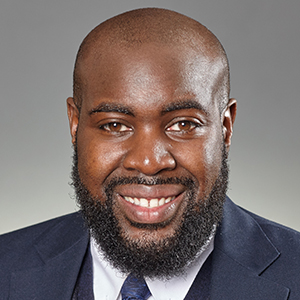
Aug. 19, 2020 – Few may have predicted that Louisiana native Alexander Lodge would begin his legal career practicing in Wisconsin, but there are undoubtedly many in Madison – and beyond – who are glad he’s found his way to the Badger state.
Lodge is the 2020 Pro Bono Attorney of the Year presented by the State Bar of Wisconsin Legal Assistance Committee. The award recognizes a lawyer who demonstrates dedication to the development and delivery of legal services to the poor or contributed significantly toward developing innovative ways to deliver volunteer legal services.
The State Bar celebrates this award and others each year with the Member Recognition Celebration, held in June at the State Bar Annual Meeting & Conference. Due to COVID-19 and concerns for the safety of State Bar members, the celebration of our 2020 award recipients is held via video. Join in and see the ceremony on WisBar.org, including Lodge's acceptance remarks.
A patent attorney at Foley & Lardner LLP in Madison, Lodge “is a leader in expanding access to legal assistance for expungement issues in Wisconsin,” said Miri Pogoriler, committee chair.
Beginning in 2018, Lodge has put together community resource organizations and volunteer attorneys to operate expungement and criminal record clinics in the Madison area. Thanks to his efforts, he and other attorney volunteers have now assisted more than 220 low-income clients.
“Unfortunately, our society treats a criminal record as a scarlet letter,” Lodge said. In helping clients “you’re lifting a burden off someone’s shoulders. And they are able to see that there is a huge community of legal professionals committed to seeing everyone in our community as valuable.”
From Acetylcholinesterase to Expungement
Lodge’s path to practicing in law in Wisconsin involved a stop in Iowa for a Ph.D. in chemistry, after obtaining his undergrad degree in his native Louisiana at Grambling State University. His doctoral research involved researching the reaction mechanism for acetylcholinesterase – important for neuromuscular function, including in fighting Alzheimer’s disease and countering nerve agents.
 Shannon Green is communications writer for the State Bar of Wisconsin, Madison. She can be reached by email or by phone at (608) 250-6135.
Shannon Green is communications writer for the State Bar of Wisconsin, Madison. She can be reached by email or by phone at (608) 250-6135.
In 2013, Lodge chose law school – and after graduating with his J.D. from the University of Iowa College of Law in 2016, he naturally found his way into patent law. “This allows me to nerd out every day,” Lodge said. “I can be at the cusp of innovation without being in the lab, as an advocate for inventors.”
Another important part of his background prompted him not just to pursue law, but pro bono work. “I was youth mentor for many years – and realized I could really make an impact as an advocate in the legal field,” he said. “In research lab, you understand the ultimate goal, but it’s hard to conceptualize sometimes the end impact on society until much later. Law allows you to have a more immediate impact on the community and the society.”
A conversation shortly after his arrival in Madison in 2016 sparked the idea for an expungement clinic. “I was looking for opportunities. It was part of a conversation, and it stuck around in me for a while,” Lodge said.
From Milwaukee to Madison
In 2017, Lodge attended training for expungement work in Milwaukee, organized by leaders such as Kori Ashley and Sheila Sullivan. When he volunteered his time at a clinic, he realized that such a clinic would be possible in Madison, too.
Shortly after, he put the word out that he was planning an expungement clinic in Madison – and was not surprised at the enthusiastic response. “There are many attorneys dedicated to pro bono work, to taking time out of their busy practices to do this. It felt very reassuring that there is a desire across our community to do this,” he said.
Lodge led recruitment efforts to train over 40 volunteers for the free Expungement and Arrest Record Correction Clinics. He also recruited enthusiastic support from area partners, including the Urban League of Greater Madison, the Urban League of Racine and Kenosha, the State Bar of Wisconsin, Wisconsin Association of African American Lawyers, Foley & Lardner LLP, City of Racine, County of Racine, U.W. Law School, and Legal Action of Wisconsin.
At their first clinic in Madison in June 2018, 125 people showed up. “We were expecting about 50,” Lodge said. To date, they’ve held around 10 clinics and assisted more than 220 low-income clients.
Moving to a Virtual Clinic
In fact, in early 2020, Lodge and other organizers were scheduling additional clinics in Madison and Milwaukee. “We had very ambitious plans for 2020,” Lodge said.
Then, of course, COVID-19 changed everything. “We had to pause, of course,” Lodge said.
They conducted more research and planning, and now operate the clinics virtually – with all their partners on board. Working especially with the Urban League, the volunteers are able to find ways to connect individually with low-income clients without computers and internet at home. “Urban League offers a safe, confidential place for them to meet via video conference,” Lodge said.
The result, in fact, is the ability to offer assistance without the need for clients to travel far. “We’ve now expanded the number of attorneys volunteering in our clinics and are helping more clients that need our services,” Lodge said.
Expungement Combats Poverty
Expungement is an important part of fighting poverty. “Unfortunate decisions in someone’s past can make barriers to housing and employment – creating unnecessary poverty that is hard to climb out of,” he said.
At the clinics, volunteer attorneys assisted with expungement and removing damaging information from criminal record reports – all items that create barriers to employment and professional licensing. These barriers create housing and food insecurity – something that involves children when the involved person is a parent.
After the success of the initial clinics, Legal Action of Wisconsin was able to establish clinics at Madison College and Milwaukee Area Technical College, allowing more clients to receive legal assistance.
“The legal services at these events is critical also in helping them find meaningful and stable employment – and all this lessens poverty in Wisconsin,” Pogoriler said.
Learn who else is an award recipient this year, as we honor them in other issues of InsideTrack.
